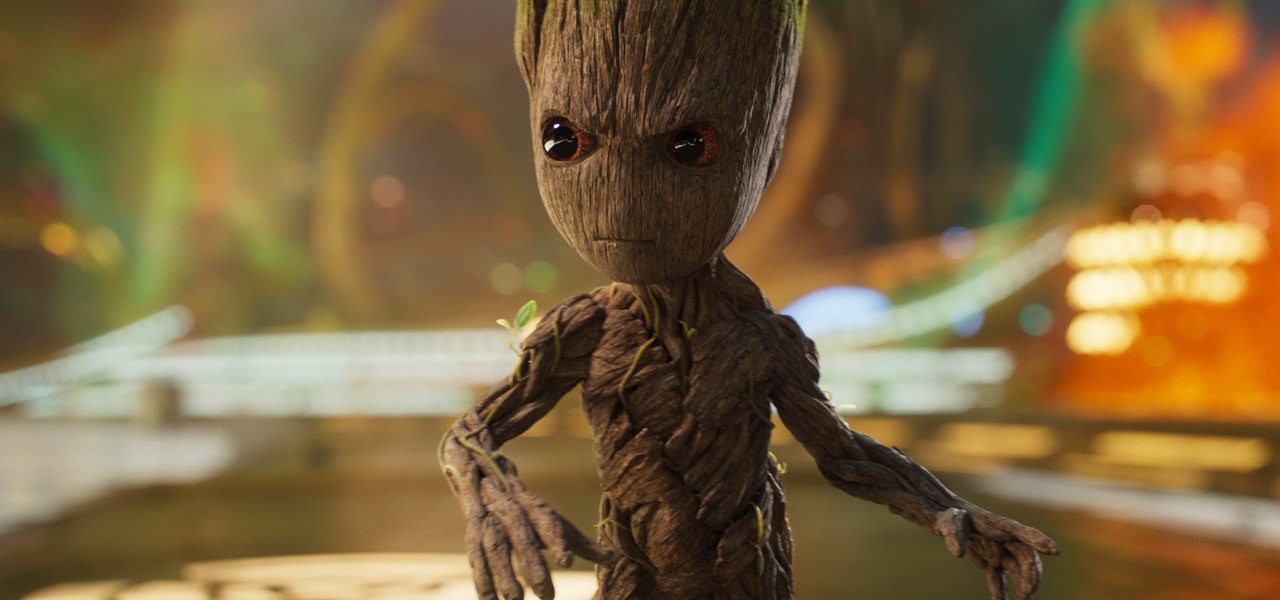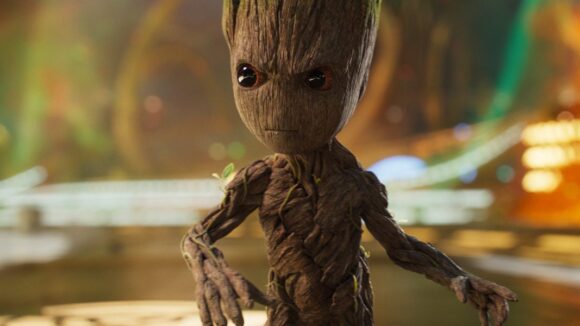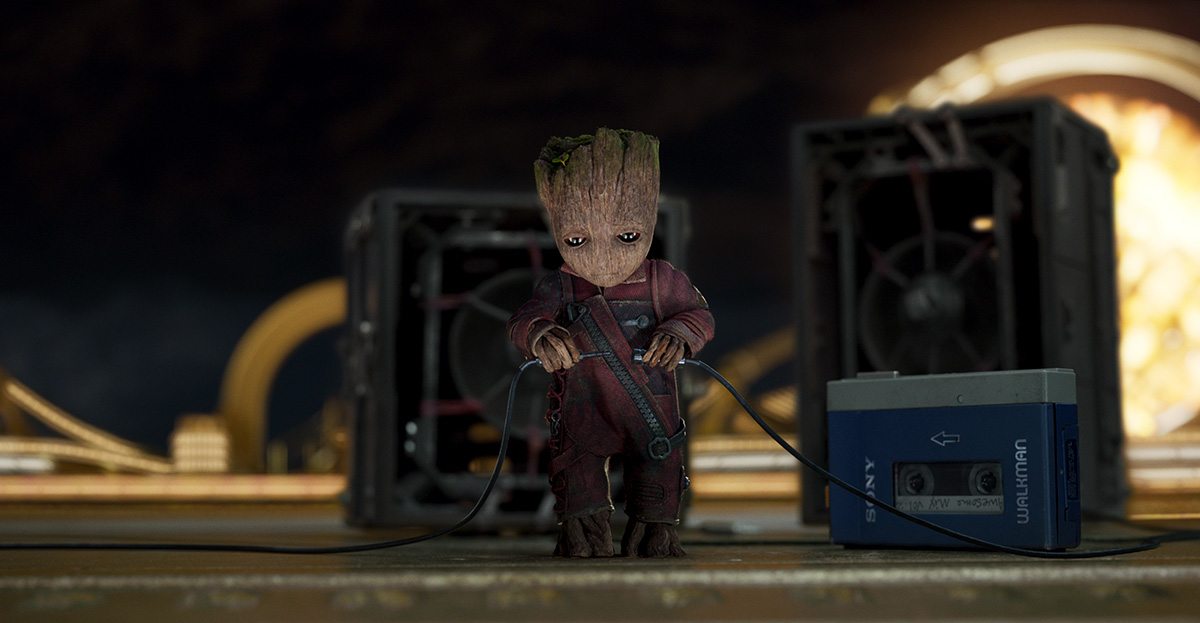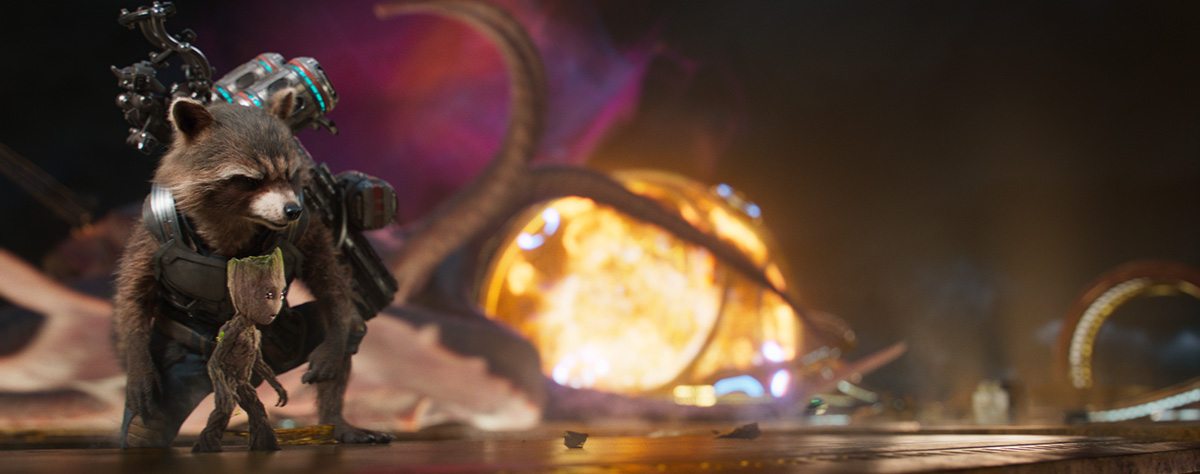

How They Animated Baby Groot In That Epic Opening To ‘Guardians Of The Galaxy Vol. 2’
At the end of James Gunn’s 2014 film Guardians of the Galaxy, audiences were left with the incredibly cute impression of the dancing Baby Groot character. As the sequel, Vol. 2, starts up, Baby Groot returns in rousing form with an insanely long dance sequence to the tune of Electric Light Orchestra’s 1978 hit “Mr. Blue Sky.”
Just having Groot bust a few moves might be impressive enough, but he does so while being none the wiser to the other Guardians battling a giant tentacled ‘Abilisk’ in the background.
The sequence was the work of visual effects studio Framestore, who brought Baby Groot, the Abilisk, some Guardian digital doubles, and the cg environments to life. Cartoon Brew found out from Framestore animation supervisor Arslan Elver how they made the elaborate scene possible.
Finding Groot
Before they tackled the dance sequence, Framestore had to model and build Groot and establish his animation style. A maquette had been utilized on set but this was only a guideline for eyelines and camera placement. In terms of animation, Framestore actually looked initially to babies and young children.

However, after roto-mating some running scenes and crawling shots, the feeling was that Baby Groot looked too much like a human baby. Although in the film the character is often blissfully unaware of his surroundings, he needed to be more mature than simply a baby.
“It’s not that he’s young and stupid, he’s slightly autistic,” said animation supervisor Arslan Elver. “That’s the word I like to use a lot to define him. So he might be looking at something while there’s a really big fight going on, and he just doesn’t pay any attention, and then all of a sudden he hears something and that connects him back.”
One of the biggest issues, too, was that when Baby Groot was right next to a human character, he was much, much smaller. The first animation tests also showed he would fall behind very quickly in a normal walk or running cycle. So Framestore tapped into more of the character that James Gunn was after – slightly ‘wilder.’ The animators found reference of a child running who stumbled a lot. This was perfect for Groot, and in the running cycle they cheated the steps to make him move an extra distance without having to take extra steps.

The Baby Groot model was fitted out with large wide eyes to play up the cute character, while his face remained relatively static to reflect the fact that it is essentially a tree surface. The face was intentionally built this way, too, to enable Groot to have relatively blank expressions.
“We also knew, from the first film, that Groot would be very quiet,” added Elver. “When he acts he doesn’t use his hands. It’s very subdued, it’s very subtle. And based on that, I told my animators to imagine a sphere around the character. How big is that sphere that his hands can go? We needed to make sure that he didn’t overact.”
Animation beats
The opening dance and battle in which Baby Groot features is a two-and-a-half minute ‘oner’ – appearing in the film without any noticeable cuts. Ultimately it would be split up over 11 shots and shared between Framestore animators, but previs studio The Third Floor took the reigns of first planning out specific beats. For that they used a blocky stick figure Groot. Then Framestore took the virtual cameras from The Third Floor and produced a first block pass.

One of the visual effects studio’s preliminary challenges was to work out just how Baby Groot would dance. This became the domain of James Gunn, who was shot on video as reference which Framestore used for that first pass. In the end, the studio effectively had to animate the sequence twice, partly because the song choice changed to ‘Mr. Blue Sky’ by Electric Light Orchestra (it was originally the same band’s “Livin’ Thing”), and partly as a result of the first pass appearing almost too ‘human.’
Gunn re-thought the performance so that Groot would begin the dance more in the moment and internalize the dancing, only later making more extravagant moves. “We also needed to find the alienness of Groot, even though he’s a biped character, and even though he has human-like proportions,” said Elver.
Since the scene was more than two minutes long and split up between different artists, Framestore developed a tool that enabled each animator to be imported to the adjacent shot as a mesh – “it would hook up beautifully,” noted Elver.
Baby Groot weaves in and out of the action as the Guardians tackle the alien Abilisk creature. Occasionally this action becomes front and center, but mostly it remains in the background for the dance number. This is despite the fact that the characters are often flying, shooting, and getting thrown around.
“There was so much to look at from an animation perspective, so you had to think about it, like, ‘Okay where am I gonna put my money most?’ What’s the most important thing here?’” related Elver. “There might be an explosion that would cover the Abilisk, but luckily it didn’t have to be perfectly looked after in the manner of every fine detail because it was going to be out of focus.”
Eventually Drax (Dave Bautista) takes on the creature from the inside and the Guardians win the day. But by then Baby Groot has easily won the audience’s hearts.

